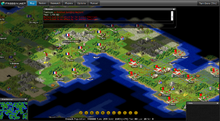- Browser game
-
A browser game is a computer game that is played over the Internet using a web browser.[1] Browser games can be created and run using standard web technologies[2] or browser plug-ins. Browser games include all video game genres and can be single-player or multiplayer. Browser games are also portable and can be played on multiple different devices or web browsers.[3]
Browser games come in many genres and themes that appeal to both core players and casual players.
Contents
Characteristics
Browser games are often free-to-play and do not require any client software to be installed apart from a web browser. Multiplayer browser games have an additional focus on social interaction, often on a massive scale. Due to the accessibility of browser games, they are often played in more frequent, shorter sessions compared to traditional computer games.[4]
Since browser games run isolated from hardware in a web browser, they can run on many different operating systems without having to be ported to each platform.[5]
Technologies
Browser games can take advantage of different technologies in order to function.
Web standards
Standard web technologies such as HTML, CSS, and JavaScript can be used to make browser games, but these have had limited success because of issues with browser compatibility and quality. These technologies, collectively termed dynamic HTML, allow for games that can be run in all standards-compliant browsers.[6] In addition, dedicated graphics technologies such as SVG and canvas allow for the fast rendering of vector and raster graphics respectively.[2] In addition, WebGL allows for hardware-accelerated 3D support in the browser.[7][8]
Comparison of web technologies[notes 1] Chrome Firefox Internet Explorer Opera Safari SVG Yes Yes Yes Yes Yes Canvas Yes Yes Yes Yes Yes WebGL Yes Yes[9] No No No Plug-in
Browser plug-ins can be used to provide game technologies after being installed by the user.
Comparison of browser plug-ins Windows Mac OS X Linux License[notes 2] Installed base[notes 3] Flash Yes Yes Yes Proprietary[10] 96%[11] Java Yes Yes Yes Proprietary[12] 78%[11] Shockwave Yes Yes No Proprietary[13] 52%[14] Silverlight Yes Yes Yes (Moonlight - LGPL) Proprietary[15] 62%[11] Unity Yes Yes No Proprietary[16] 1%[17] Criticisms
Browser games can be a distraction in work environments, causing lost productivity. A noteworthy example occurred in May, 2010, when Google replaced their normal logo with a playable rendition of Pac-Man. Research concluded that Google's playable logo caused users to spend an extra 36 seconds on Google's homepage, causing workplaces an estimated total of 4.82 million hours of lost productivity at an estimated cost of over $120 million USD.[18][19]
See also
- List of browser games
- List of multiplayer browser games
- List of browser-based game websites
Notes
References
- ^ D Schultheiss: Long-term motivations to play MMOGs: A longitudinal study on motivations, experience and behavior, page 344. DiGRA, 2007.
- ^ a b "Graphics - W3C". W3.org. 2010-02-18. http://www.w3.org/standards/webdesign/graphics#uses. Retrieved 2010-05-20.
- ^ "The PBBG Project". Pbbg.org. http://www.pbbg.org/default.asp. Retrieved 2010-05-20.
- ^ C Klimmt: Exploring the Enjoyment of Playing Browser Games, page 231. CyberPsychology & Behavior, 2009.
- ^ E Adams: Fundamentals of Game Design, page 80. New Riders, 2009.
- ^ By Stephen DownesAugust 17, 1999 11:01 p.m.. "Fun and Games With DHTML ~ Stephen's Web ~ by Stephen Downes". Downes.ca. http://www.downes.ca/post/276. Retrieved 2010-05-20.
- ^ Anthony, Sebastian (2009-12-11). "3D browser apps and games creep ever closer with the WebGL draft standard". Downloadsquad.com. http://www.downloadsquad.com/2009/12/11/3d-browser-apps-and-games-creep-ever-closer-with-the-webgl-draft/. Retrieved 2010-05-20.
- ^ "Google Web Toolkit Blog: Look ma, no plugin!". Googlewebtoolkit.blogspot.com. 2010-04-01. http://googlewebtoolkit.blogspot.com/2010/04/look-ma-no-plugin.html. Retrieved 2010-05-20.
- ^ http://www.mozilla.com/en-US/firefox/4.0/releasenotes/
- ^ "Flash EULA". http://www.adobe.com/products/eulas/pdfs/PlatformClients_PC_WWEULA_Combined_20100108_1657.pdf. Retrieved 2011-03-10.
- ^ a b c "Web Browser Plugin Market Share / Global Usage". Statowl.com. http://www.statowl.com/plugin_overview.php. Retrieved 2010-04-08.
- ^ "Oracle Corporation Binary Code License Agreement". http://www.java.com/en/download/license.jsp. Retrieved 2011-03-10.
- ^ "Shockwave EULA". http://www.adobe.com/products/eulas/pdfs/Player_WW_EULA-en_US-20060724_1430.pdf. Retrieved 2011-03-10.
- ^ "Shockwave Player Adoption Statistics". Adobe. http://www.adobe.com/products/player_census/shockwaveplayer/. Retrieved 2010-04-08.
- ^ "Terms Of Use". http://www.silverlight.net/termsofuse.aspx#D. Retrieved 2011-03-10.
- ^ "END USER LICENSE AGREEMENT". http://unity3d.com/unity/unity-end-user-license-3.x. Retrieved 2011-03-10.
- ^ "Thoughts On Browser Plugin Penetration". Unity Technologies. http://blogs.unity3d.com/2008/03/31/thoughts-on-browser-plugin-penetration/. Retrieved 2011-03-10.
- ^ "Google Pac-Man eats up work time". BBC News (BBC News). 2010-05.25. http://www.bbc.co.uk/news/10153286. Retrieved 2011-06-27.
- ^ Frum, Larry (2010-05.25). "Google Pac-Man eats 4.8 million hours". SciTechBlog (CNN). http://scitech.blogs.cnn.com/2010/05/25/google-pac-man-eats-4-8-million-hours/. Retrieved 2011-06-27.
External links
Multiplayer video games Types History Concepts Cooperative gameplay · Virtual economy (Virtual currency · Virtual good · Virtual tax) · Social interaction · Virtual world (Persistent world)See also Categories:- Browser-based games
- Video game genres
Wikimedia Foundation. 2010.


